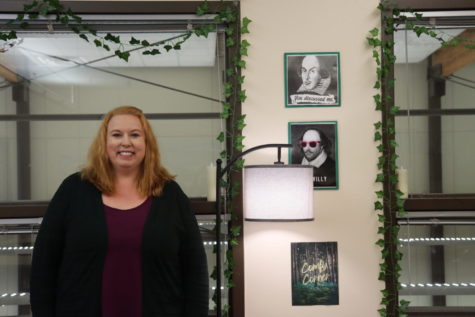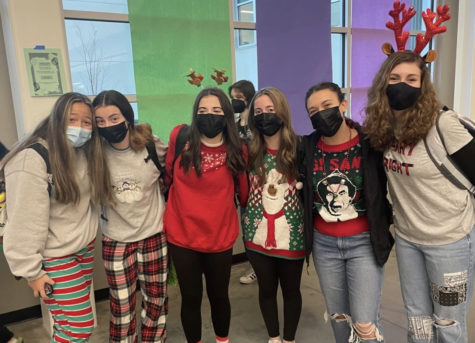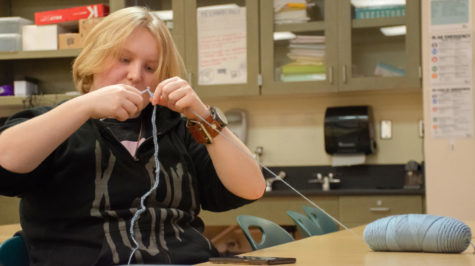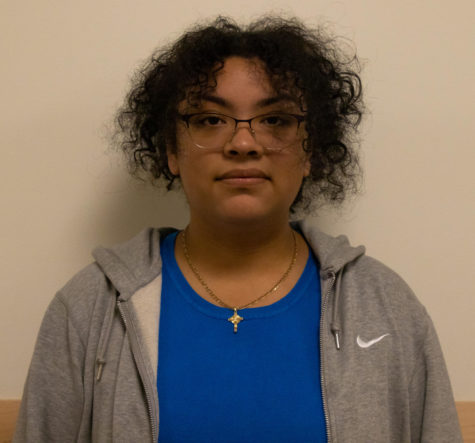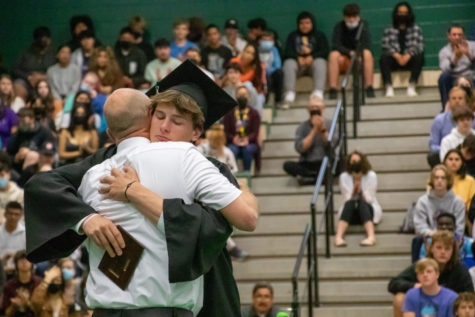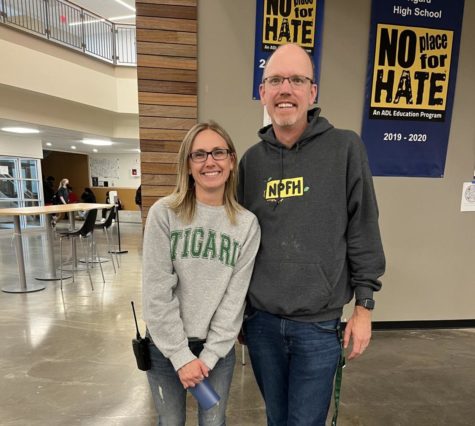Tech team robots roll out
April 27, 2017
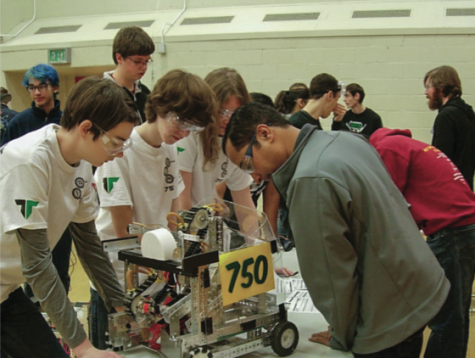
Robotics program develops student engineers
There is an area in Tigard High that stays bustling with energy even after classes end at 3:05 p.m. After school, Tigernet is a community of engineers, programmers, and thinkers, all members of the extracurricular tech team.
One particular group within this club (the FIRST Tech Challenge teams) is busy tinkering and reworking the robots that they put all their teamwork and pride into.
The FIRST Tech Challenge (FTC) is a global program that combines education with competition in one environment, and creates a positive image for the future of invention and innovation.
Tigard High School belongs to the Beaverton FTC League. Tech teacher Steve Fulton coaches four teams: Gears in Motion, The Jury Riggers, The Pac-Bots, and Twisted Metal.
Each team consists of a team captain or manager, an auxiliary group responsible for scheduling and organizing community events, and designing graphic material for the team, a scribe who documents the progress of the robot’s design process and usually one builder and programmer.
The central objective of the FTC is to build and program robots to complete specific challenges, which change each year. Some of the current season’s tasks include shooting a small ball into a hoop autonomously and pushing a button until it lights the correct color.
At the beginning of the year, the teams brainstorm ideas, then prototype, build, and test their robots to prepare for the first local games. The robots are mainly built with TETRIX metal pieces and basic servos and motors, but there is a wide variety of materials that can be used.
The teams use whatever they can get their hands on, from tape, plexiglass and aluminum, to 3D-printed parts custom-made for the robot. One team even hooked metal drawer slides together to make a forklift-like arm capable of lifting a large ball.
All the code for the robots is written in a Java programming language, then transferred to an Android phone which acts as the robot’s “brain”.
These robots are never a finished project, however. “The entire year, the robot is a work in progress. It works until it fails,” said senior Reed Colgrove, captain of the Pac- Bots team.
Throughout the season, each team works hard to make their robots better and better by improvising, tweaking and rebuilding whatever they can.
After about a month of building the robot, local games will commence at buildings and community centers close to the Tigard-Beaverton area. At these games, every team’s goal is to score as many points as possible by completing as many challenges with their robots as fast as they can.
Depending on the team set up, the Tigard High teams can compete against other schools or against each other as well. Matches last about three minutes with four robots in the field at a time, and teams earn points based on match wins and ties against other teams.
There are no disqualifications yet — these points only determine the team’s starting rank in tournaments once all the local games are over. Winners of local tournaments will advance to Oregon’s statewide competitions and so on until they progress to national and international levels. All teams can go on until they are disqualified from the season.
These robots don’t go out and about only to compete. Sometimes, the THS teams take their robots to community events, like the state fair, where they show their creations to the public and act as representatives for the FTC.
While at first the FTC may seem like a straight-up competitive atmosphere, it’s a lot more than that once you go behind the stage. Even if the teams are competing, they still work together as a community, giving advice and feedback on each other’s robots. Derek Williams is the sophomore programmer for Twisted Metal.
“I like working with a team, with people who don’t have the same knowledge as you. You all have different talents that you can put together,” Williams said. The program is built for a greater purpose. It’s not just someone trying to beat someone else; it’s a new dimension of students who go that extra mile to become the engineers and problem-solvers of the next generation. The FTC doesn’t just teach technical skill. The program incorporates leadership, teamwork and social skills as well. Because teams are split into different positions, members have to coordinate with each other to confirm that all aspects are getting done in a timely manner.
Tyler Walker, sophomore and lead marketing for the Pac- Bots team, explained the dynamic. “You learn how to work together with people and communicate to make sure the job gets done,” Walker said. The FTC members agree that the best part of the league is the community of students, each one with a different story, who come together for a single goal.
Sophomore Justin Lemke, for example, was interested in robotics when he joined, and is now lead programmer for Gears in Motion, this being his second year in the FTC. “It’s pretty great. There’s a lot of people I know. Everyone’s really nice,” he said.
Josh Hancock, junior and co-leader of Twisted Metal, was encouraged to join by his father, who is an engineer. “I really like the problem solving, and executing the tasks that need to be done,” Hancock said. “The teamwork gave me a lot of good leadership opportunities, and I’m a lot more interested in engineering as a future career.”
Derek Williams was recommended to join the FTC based on his interest in programming. “I want to get a master’s degree and possibly be a software developer or a computer scientist,” he said.
Jan Carlson had a hard time fitting in anywhere during her freshman year, but she is now a successful junior who enjoys the FTC. “If it wasn’t for FTC, I don’t know what I’d be doing,” she said. “In my freshman year, I had a really hard time finding anywhere to fit in. There’s a sense of community here, almost like a family. At the beginning of the year these people were total strangers, and now I consider them my closest friends,” Reed Colgrove said.
Daniel Au, sophomore and captain of Gears in Motion, said, “I’m really glad there are organizations like FIRST that give students the opportunity to experience technology and engineering challenges. It really helps people like me to do what they love in a great environment.” The lessons learned in the FTC can be applied to many necessary attributes of a real- world career, such as working with a team, doing your share of the job, and fitting in with a busy schedule. “You’re learning engineering skills, like what structures you can make that would work,” said Aaron Esau, freshman programmer for the Pac- Bots.
“You learn to solve difficult challenges. You have to do a lot of work to fix things, and you learn a lot from that.” The FTC somewhat progresses from the FIRST Lego League, (typically held in elementary and middle school,) but being an FLL member is not required to join the FTC.
To anyone interested in joining the prestigious program, signups are available to anyone at the beginning of the school year. Although it is generally recommended to have basic technical knowledge to some extent, anyone with a true interest can join a team. Good time management and a very free schedule is necessary to complete homework assigned in other classes on top of attending the many meetings and events. FTC meetings are regularly held after school from 5:30 to 8 p.m. on Tuesdays, Thursdays, and sometimes Wednesdays. Off-campus tournaments are typically all day Saturday events. It would also be well- advised to join as early as possible, especially before Club Rush.
Recently, teams have been set to about eight or nine members max, and the teams are always in high demand. As of Feb. 14, Gears in Motion and Twisted Metal were among the teams chosen to advance to the Oregon State Championships. Both teams will work hard to be the first Tigard High teams in history to advance to the super regionals, and become another great representative of this school’s strong spirit and and dedication to building a greater future.










